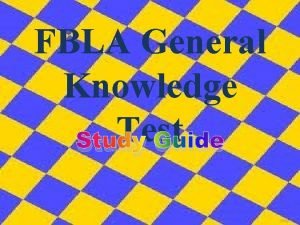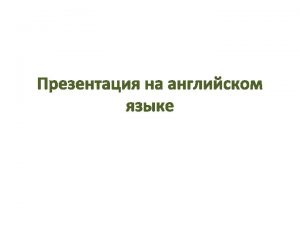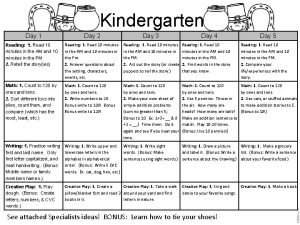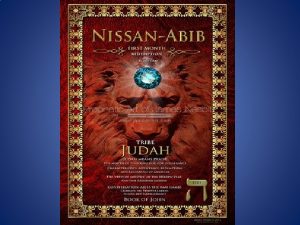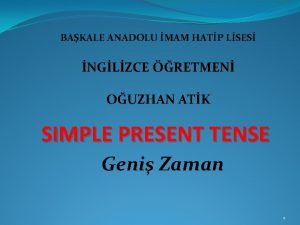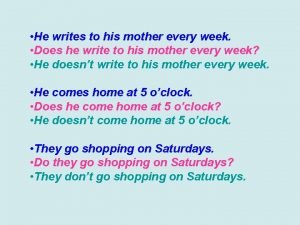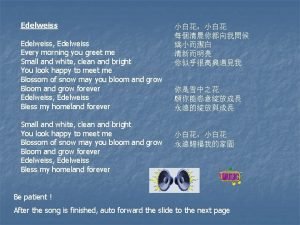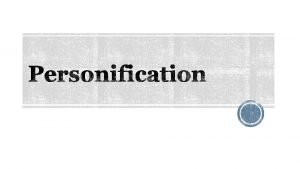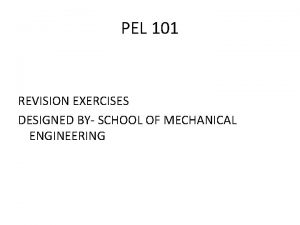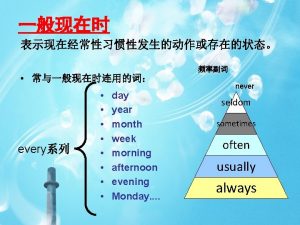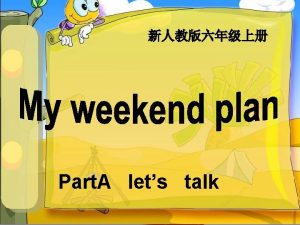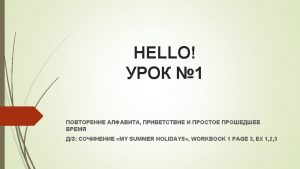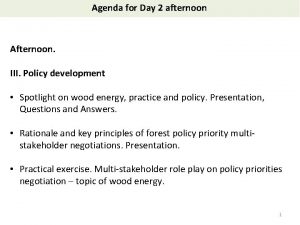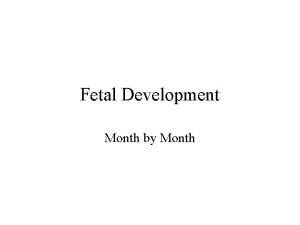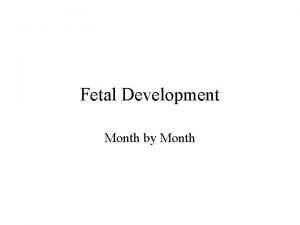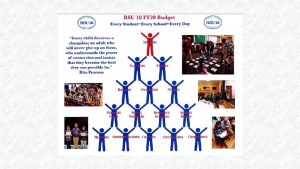every day year month week morning afternoon evening

































- Slides: 33

一般现在时 表示现在经常性习惯性发生的动作或存在的状态。 • 常与一般现在时连用的词: every系列 • • day year month week morning afternoon evening Monday. . 频率副词 never seldom sometimes often usually always

次数 一次 once 两次 twice 三次 three times 一周两次 twice a week 每周四次 four times a week 每周六 on Saturdays 每周日 on Sundays

1. 表示现在的状态: e. g. He’s twelve. 用法 She’s at work. 2. 表经常或习惯性的动作: e. g. I get up at 6: 30 every day. He reads English every morning. 常用的状语:often , sometimes , usually , every day 等。 3. 表主语具备的性格和能力等: e. g. She likes noodles. They speak French. 4. 表示不受时间限制的普遍真理和自然规律: e. g. Two and four is six. The moon goes around the earth.



Exercise • • is 1、Kitty an English girl. are 2、We students. am 3、I from Taizhou. is 4、She tall. are 5、Lucy and Lily good friends. are 6、Those chairs broken. is 7、The bag mine.

否定句的构成 主语 + be + not + 其他 is not = isn’t am not= ’m not are not= aren’t

isn’t 1、Kitty (not) an English girl. aren’t 2、We (not) students. am not 3、I (not) from Taizhou. isn’t 4、She (not) tall. aren’t 5、Lucy and Lily (not)good friends. aren’t • 6、Those chairs (not) broken. isn’t • 7、The bag (not) mine. • • •


否定句的构成 主语 + 情态动词 + not + 动词原形 + 其他 can not = could not = must not = would not = will not = should not = may not = can’t couldn’t mustn’t wouldn’t won’t shouldn’t may not

• • She (can not) speak English. You (must not) open the door. They (should not) be right. I (will not) go to Japan.



Complete the sentences. Use the simple present tense of the verbs in brackets 1. My father_______(listen) to the radio every day. listens studies (study) in a middle school. 2. Mike_______ takes 3. She______(take) Eddie for a walk after supper. washes 4. He_______(wash) clothes with his hands. passes (pass) the ball to Daniel. 5. Simon ______ teaches (teach) Chinese. 6. Miss Li_______ 7. Look at the animal, it ____ has four legs. 8

否定句的构成 主语 + 助动词(do/does)+not +行为动词原形 + 其他 These boys don’t(do not) like playing football. These boys like playing football. The girl doesn’t (does not)read English every morning. The girl reads English every morning. 什么时候用助动词do,什么时候用助动词does呢? 取 决 于 主 语

Change the following sentences after the models. Model 1: Model 2. I like fish. (meat) I don’t like meat. He likes reading. (writing) He doesn’t like writing. 1. I like red. (green) I don’t like green. 2. They like apples. (oranges) They don’t like orange. 3. We take a bus to school every day. (walk to school) We don’t walk to school every day. 10

当主语为复数时,用助动词do构成否定 当主语为单数时,用助动词does构成否定 注意:don’t 和 doesn’t 之后动词一定要用原形 Model 1: Model 2. I like fish. (meat) I don’t like meat. He likes reading. (writing) He doesn’t like writing. 4. His brother plays football after school. (play basketball) His brother doesn’t play basketball. 5. It looks like a cat. (hat) It doesn’t look like a hat. 6. She has a dog at home. (a cat) She doesn’t have a cat at home. 11

Complete the sentences. Use the proper verb forms in brackets plays 1. Jordan _______(play) basketball. play He doesn’t ______(not play) football. go 2. I _______(go) swimming on Sunday. don’t go But I______ (not go) shopping. 3. My cousins _______(enjoy) computer games. enjoy But they don’t _____(not enjoy) ball games. enjoy 4. You _______(like) fish. like But he ______(not like) fish. doesn’t like 12





I am an English teacher. → Are you an English teacher? We can speak English → Can you speak English ?




We read English every morning. → Do you read English every morning? Tom’s father listens to English on the radio every evening. → Does Tom’s father listen to English on the radio every evening?

句型转换 • 1. Mr. Green comes from Shanghai. • (改为一般疑问句) Does Mr. Green come from Shanghai? • 2. Millie lives in a flat in Beijing. • (改为否定句) Millie doesn’t live in a flat in Beijing.

• 3. Daniel enjoys playing computer games. • (改为一般疑问句并做肯定回答) Does Daniel enjoy playing computer games? Yes, he does.

some、any • 一般说来,some 用于肯定句中,any 用于否定句 和疑问句中 。 改疑问句或否定句时,原句里的 some要改成any There are some books on the desk. (改为否定句) →There aren’t any books on the desk. →Are there any books on the desk?


and or • 变否定句时,and要变成or There is some air and water on the moon. → There isn't any air or water on the moon. He has some brothers and sisters. →He doesn’t have any brothers or sisters.

在否定句当中,too要改为either I like eating apples, too. →I don’t like eating apples, either.
 The first fbla state chapter was located in
The first fbla state chapter was located in Tom hello good morning
Tom hello good morning Good evening good morning good afternoon
Good evening good morning good afternoon Good morning afternoon evening
Good morning afternoon evening Day 1 day 2 day 3 day 4
Day 1 day 2 day 3 day 4 Como te llamas in spanish
Como te llamas in spanish Every rotarian every year
Every rotarian every year Nobody loves me like you love me jesus
Nobody loves me like you love me jesus Every child every day
Every child every day Month abib jewish calendar
Month abib jewish calendar Sidereal vs synodic month
Sidereal vs synodic month What is prufrock's problem
What is prufrock's problem Nglzce sunumlar
Nglzce sunumlar Every sunday evening
Every sunday evening Sunday psali
Sunday psali Day 1 day 2 day 817
Day 1 day 2 day 817 Ritika deposits 200 every month
Ritika deposits 200 every month Rainbow at night
Rainbow at night Cloud ninestiles
Cloud ninestiles Where did the children come from every afternoon
Where did the children come from every afternoon Favorite month of the year
Favorite month of the year Week by week plans for documenting children's development
Week by week plans for documenting children's development Every week his mother goes to university
Every week his mother goes to university Every country and every nation
Every country and every nation Microsoft's mission statement
Microsoft's mission statement Every knee shall bow every tongue confess
Every knee shall bow every tongue confess Every nation and every country
Every nation and every country Every picture has a story and every story has a moment
Every picture has a story and every story has a moment Sunday week 1 morning prayer
Sunday week 1 morning prayer Days of the week and months of the year
Days of the week and months of the year Good moring class
Good moring class Can you greet me every morning
Can you greet me every morning My alarm clock yells at me every morning
My alarm clock yells at me every morning The eight slots on pam's extra large toaster
The eight slots on pam's extra large toaster
